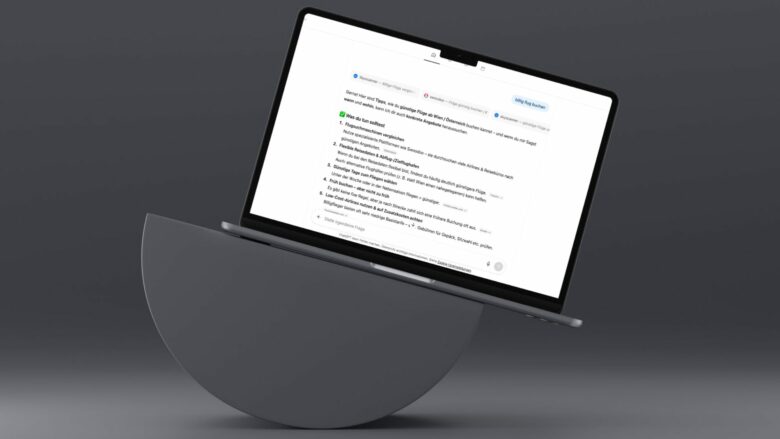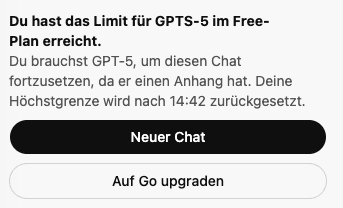ChatGPT Atlas: If you’re looking for an anti-web browser, you are right here

It is probably the famous solution looking for a problem: OpenAI has as reported, launched ChatGPT Atlas, its own free AI browser, which is not only meant to be an alternative to other AI browsers like Comet from Perplexity, but is also positioned against the market leader Chrome from Google. Because clearly: browsers are among the most used software in the world and are billion-dollar businesses for Google or Apple (more on that here). For a consumer brand like ChatGPT, this is a desirable position to firmly establish itself in the daily use of potentially billions of users.
However: Chrome was launched in 2008, Apple’s Safari already in 2003. Both browsers had 17 and 22 years respectively to mature into what they are today. ChatGPT Atlas, on the other hand, is just one week old, and what can we say: it shows. Let’s get one thing straight right away: just because Atlas now exists, hardly anyone will uninstall Chrome, Safari, Firefox, or any other browser and only surf the web with the ChatGPT browser.
No Atlas without Google
ChatGPT Atlas has the basic features of a classic browser: import of bookmarks from other browsers, password manager, storage for payment methods, and so on. You quickly notice that it doesn’t work without Google Chrome: you get browser extensions from the Chrome Web Store. Tech-savvy users see it immediately: ChatGPT Atlas is simply a modified Chromium variant, and Chromium is simply the open-source version of Chrome. In other words: without Google, nothing works even on a technical level.
What Atlas wants to differentiate itself with is the deep integration of ChatGPT. For this, there is a sidebar on the right where you can communicate with OpenAI’s chatbot, always in relation to the website you currently have open in the respective tab. For example, you can ask ChatGPT to create a list of all startups that Trending Topics has reported on in the past six months. At first glance, the result looks quite good, but at second glance it doesn’t: the list is incomplete, so you would have to manually check what’s missing. So better do it yourself from the start.
Upgrade to continue…
You have similar experiences when you try to do other things you normally do on the web with Atlas: like searching for a cheap flight, a hotel, or a used car. Example car search: if you ask the chat sidebar on a car site for “family station wagon, gasoline engine, maximum 50,000 km, maximum 20,000 euros,” you first get an incomplete list of cars that supposedly exist on the site. In a second step, ChatGPT can fill out the search mask, generate a link, and then send it to the chat – then you can jump to the corresponding search query. And you say to yourself: well, I could have filled that out myself right away, instead of writing it in the chat.
Ok, let’s continue surfing to social media. On LinkedIn, for example, you can ask ChatGPT to draft a post, for instance on the topic of AI sovereignty. The expected comes out. However, Atlas cannot post by itself, but asks you to copy the text into your profile and publish it there. Here again the experience: I could have done this manually myself.
And then comes the brake on top, which ultimately reveals what OpenAI is really about with Atlas. Because in the free mode, ChatGPT usage is limited to just a few queries. To continue, you need to upgrade to the new Go tariff, which costs 8 euros per month. Existing users can of course also log in with their Plus or Pro accounts. Ultimately, this means: if you really want to use Atlas’s USP, you need a paid ChatGPT subscription; you don’t get very far with the free version.

Where is the web??
Fundamentally, there is a very significant problem with Atlas: you obviously cannot set a search engine (Google, DuckDuckGo, etc.) as in other browsers, but ChatGPT wants to take on this role. The result is really bad: instead of getting a list of flight search engines as elsewhere, ChatGPT wants to explain how online flight search works in the first place; it depends on departure airport, travel period, travel duration, and much more. Thanks for the info. Hidden in a second tab, there is then a list of links with 12 flight search engines that you can access. And now the big joke: if you need more, you are redirected to – Google.
Then there are also performance and security issues. ChatGPT Atlas is, as you can quickly see in the Speedometer 3.1 test, simply slow. The OpenAI browser achieves a score of just 23.2, while Google’s Chrome on the same computer reaches 38 points. So if you’re looking for a slow Chromium browser, Atlas is right for you.
Collecting data, scraping websites
In return, you’re buying privacy and security problems. Let’s start with data processing: inputs into the browser are used by default to train OpenAI’s AI models, unless you opt out. But it goes further: apparently, OpenAI also wants to use browser users as web scrapers. You can opt in to allow the company to use the contents of websites you visit for training ChatGPT. Only those websites that block the GPTBot will not be trained.
ChatGPT Atlas would also like to thoroughly screen the user: you can choose to enable “Browser Memories.” This is supposed to give you a better personalized experience. OpenAI wants to save the context of visited websites and retrieve it when needed. Users can then ask, for example: “Find all job postings I looked at last week and create a summary of industry trends.” For user profiling, these are of course valuable data for OpenAI, which also wants to enter the advertising business in the foreseeable future.
Security researchers warn of pitfalls
Speaking of security: SquareX, for example, warns that Atlas could be induced to book a hotel room, delete files, or send messages to someone from a user’s contacts if a malicious website has embedded hidden prompts in its design. This does not inspire confidence, especially since the agent is the USP of the browser.
Poor performance, no discernible added value, data collection, security vulnerabilities: all in all, ChatGPT Atlas cannot be recommended to anyone at this point. The browser may be good for OpenAI and its investor story (“We’re attacking Google on all fronts”), but there are currently no decisive advantages for the user. Better stay away until this piece of software has really been improved.






























